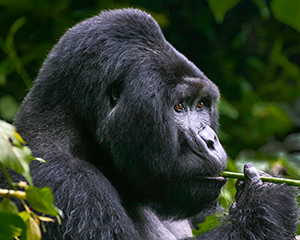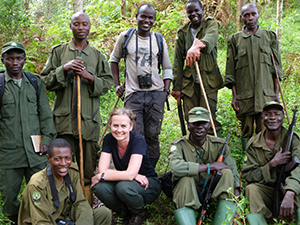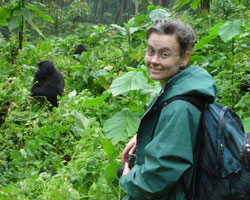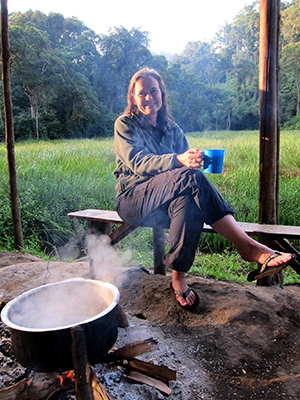Martha Robbins
Group leader
Department of Primate Behavior and Evolution
Max Planck Institute for Evolutionary Anthropology
Deutscher Platz 6
04103 Leipzig
phone: +49 (0) 341 3550 210
e-mail:
robbins@[>>> Please remove the text! <<<]eva.mpg.de
Research Interests


My overarching research interest is the evolution of sociality. For over 25 years, my research has focused on the causes and consequences of sociality in one of our closest relatives, the gorilla. There are two species of gorillas and four subspecies. Gorillas are a particularly interesting species because they occupy a wide range of habitats across Africa and exhibit variation in their social structure, feeding ecology, and life history patterns. I am examining topics related to gorillas’ ecology, social behavior, reproductive strategies, population dynamics, endocrinology, and genetics.
I started my research career in the early 1990’s at the Karisoke Research Center, Rwanda, where I conducted my PhD research on the mountain gorillas initially habituated by Dian Fossey in the late 1960’s. In 1998, I began my ongoing long-term research project in Bwindi Impenetrable National Park, Uganda, where I am studying the other population of mountain gorillas. This is the second longest running research project on habituated gorillas in Africa. In 2005, I began a long-term project of western gorillas in Loango National Park, Gabon, where we are studying one group of habituated western gorillas. It has been a wonderful experience to observe habituated gorillas over such a long time period and in so many different forests inhabited by gorillas. It is also important to conduct research that can contribute to conservation efforts to protect these critically endangered great apes.
Specific topics include:
Feeding Ecology: How does the diet of gorillas vary according to food availability? How does food availability influence ranging patterns and habitat utilization?
Reproductive Strategies and Social Behavior: What strategies are used by males and females to maximize their reproductive success? How do dispersal patterns influence social behavior and group dynamics? How do ecological conditions influence social relationships? How do social relationships vary among males and females?
Population Dynamics: How do populations change in size and structure over time? How do particular factors influence the changes in a population, in particular, the ecological conditions, levels of human disturbance, as well as intrinsic factors? How do life history variables differ among individuals and what impact does this have on reproductive success?
Genetics: In collaboration with the genetics lab of our department, we are able to address questions concerning paternity, relatedness, as well as group size and structure.
Conservation: While science alone will not lead to protection of endangered gorillas, research should be an integrated part of any conservation strategy. Any research on endangered species should involve a conservation component. Therefore, I have collaborated with conservation groups working in the Virunga Volcanoes and Bwindi to carry out censuses of the gorillas so we can effectively monitor changes in their population size and the impacts of conservation strategies. Additionally, we conduct projects concerning their demography and patterns of habitat utilization, which provide useful information to assist with park management practices. I also run a collaborative conservation education program (the Bwindi Ape Conservation Education Partnership, with the North Carolina Zoo and the Cleveland Metroparks Zoo) in which we work with four primary schools bordering Bwindi Impenetrable National Park, Uganda.
Curriculum Vitae

Education
- Ph.D. - Zoology, University of Wisconsin, May 1996.
- M.S. - Zoology, University of Wisconsin, Madison, December 1993.
- B.S. - Biology and Psychology (double major), University of South Carolina, May 1989
Academic Employment
| 1998-present | Research Associate, Max Planck Institute for Evolutionary Anthropology |
| 1997-1998 | Visiting Assistant Professor, Department of Biology, Gustavus Adolphus College |
| 1995-1997 | Lecturer, Depts of Psychology, Zoology, & Anthropology, University of Wisconsin |
Professional Services
Reviewer for the following journals and publishers:
- Animal Behaviour
- Behavioral Ecology & Sociobiology,
- American Journal of Physical Anthropology,
- American Journal of Primatology,
- International Journal of Primatology
- Animal Cognition
- Behavioral Ecology,
- University of Chicago Press
- Cambridge University Press
Reviewer for the following granting agencies:
- National Science Foundation
- the Leakey Foundation
- National Geographic Society.
Professional societies:
- International Primate Society
- German Primate Society
- Regular contributor of articles for Gorilla Journal (publication of Berggorilla Regenwald Direkthilfe)
- GRASP (Great Ape Survival Partnership; UNEP) Scientific Council, 2013-present
- Primates, Advisory Board member, 2012-2017
- IUCN Section on Great Apes committee member, 2002-present
- Evaluator for IUCN Red List Assessment of Gorilla beringei, 2008
- Evaluator for IUCN Red List Assessment of Gorilla beringei beringei, 2015
- Wildlife Conservation Society Fellow
- Mountain Gorilla Veterinary Program Conservation Advisory Committee Member, 2009-2011
- Mountain Gorilla Veterinary Program – Science Advisor, 2012-2013
- Art of Conservation, Advisory Council Member, 2012-2013
Invited Workshops/ Symposia
| August 2016 | Plasticity and individual variation: evolutionary significance and conservation consequences, Symposium at International Primatology Conference, Chicago. |
| May 2014 | Western Gorilla Research & Conservation Symposium, Libreville, Gabon. |
| September 2013 | Great Ape Summit, Jackson Hole, WY, |
| May 2013 | Great Ape Conservation Workshop, Brazzaville, Republic of Congo. |
| April 2013 | Reconstructing Dietary Adaptations in Human Evolution, Tempe, AZ. |
| August 2012 | Mountain Gorillas Then and Now: Celebrating 45 Years of Research at the Karisoke Research Center, Symposium at International Primatology Conference, Cancun, Mexico. |
| August 2012 | Flexibility in Social Relationships in Female-dispersal Species, Symposium at International Primatology Conference, Cancun, Mexico. |
| October 2010 | Aggression & Peacemaking in an Evolutionary Context, Lorenz Workshop, Leiden, Netherlands. |
| September 2008 | Leakey Foundation 40th Anniversary - Primatology symposium, San Francisco, CA. |
| October 2007 | Conservation for Migratory Species Gorilla Meeting, Paris, France. |
| May 2007 | Rwandan Biodiversity Conference, Kigali, Rwanda. |
| May 2005 | Great Ape Conservation Workshop, Brazzaville, Republic of Congo. |
Media
Documentaries
| 2012 | Mitt I Naturen Uganda (The Middle of Nature – Uganda). One hour of a four part series about Uganda focusing on Bwindi mountain gorillas and my research. This is the longest running and most popular nature show in Sweden. |
| 2010 | Mountain Gorilla. BBC. 3 one hour long documentaries, focusing half on Bwindi mountain gorillas, my research, and conservation activities. |
| 2009 | Berggorillas – Ugandas sanfte Riesen (Mountain gorillas – Uganda’s gentle giants). ARTE. 45 minute documentary focused on Bwindi mountain gorillas, my research, and links between conservation and the surrounding communities. |
| 2009 | Among the Apes. Firefly Productions, aired on BBC 5. One hour documentary of a four part series about wild primates, focusing on Bwindi mountain gorillas. |
| 2008 | The Gorilla King. Tigress Films. Interview in a one hour documentary using the life of a silverback gorilla to explain the conservation issues of mountain gorillas. |
